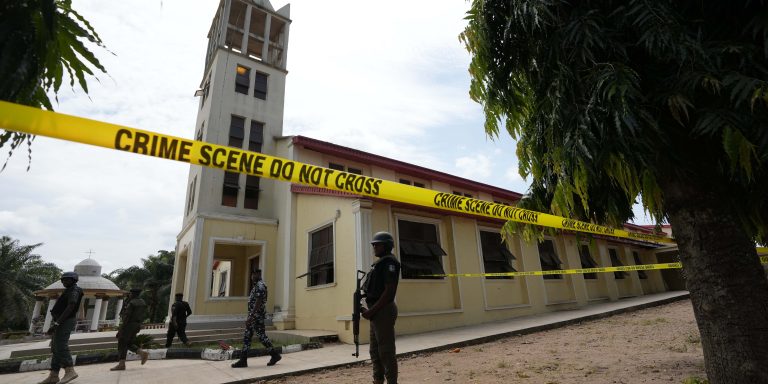INTELBRIEF
June 13, 2022
IntelBrief: Nigeria Attack Raises Questions about Expansion of Terrorist Threat

Bottom Line Up Front:
- Last week nearly 50 worshippers—including children—were killed in Nigeria, when armed men entered St. Francis Catholic Church in Owo, southwestern Nigeria.
- Questions arose about whether this constituted an expansion of the terrorist and violent extremist threats that have fueled insecurity in the northeast, but no group has claimed responsibility for the attack.
- Heavy handed security responses, democratic backsliding, and the presence of foreign private military contractors in the region have heightened tensions about increased violence in the Sahel.
- It is difficult to determine whether this constitutes a pattern of violence or an expansion of the terrorist threat. The state needs to work closely with communities to identify the threats and invest in developing sustainable mitigation measures.
Last week, approximately 50 worshippers—including children—were killed in Nigeria, when armed men entered St. Francis Catholic Church in Owo, southwestern Nigeria, and left a trail of devastation in their wake. The attack reportedly lasted about 30 minutes, and final numbers of casualties remain unclear, ranging between 38 and over 50 killed, as nearly 1,200 parishioners had gathered for services. The attack, reminiscent of terrorist attacks that have targeted worshippers in mosques, synagogues, churches, and temples across the globe, set off speculation about whether this was a terrorist attack. Moreover, questions arose about whether this constituted an expansion of the terrorist and violent extremist threats that have fueled insecurity in the northeast of the country. No group has claimed responsibility for the attack, raising the possibility that it may not have been perpetrated by a terrorist group, which would likely seek credit or to exploit such an attack to enhance their strategic posture and sow distrust against the state. A hallmark of terrorist attacks perpetrated or inspired by transnational groups like al-Qaeda or Islamic State (IS) has been the choice of “soft targets”—from the London Tube to the Boston Marathon, the Bataclan nightclub in Paris to a café in Uganda where people gathered to watch the 2010 World Cup final. Such targets have proved difficult to secure or monitor, and such attacks have required less financing or complex technology to execute. As a result, some traditional counterterrorism methods have had to adapt to the low-cost, low-tech attacks that have nonetheless delivered horrific outcomes.
Nigeria is no stranger to terrorist violence, having confronted threats from Boko Haram and its subsequent iterations or splinter groups, as well as the increased presence of regional affiliates of IS and al-Qaeda. While global deaths from terrorism fell by 1.1% in 2021, deaths in the Sahel region increased, with just four countries in the region representing 35% of all deaths from terrorism in 2021, according to the Global Terrorism Index. The increase in violence shows no signs of subsiding, as countries grapple with the confluence of climate crises, conflicts, and armed nonstate actors, whether bandits, terrorists, or others. Despite nearly two decades of international counterterrorism efforts, pervasive insecurity and cyclical conflict continue to undermine the conditions necessary for stability and peace.
Heavy handed security responses, democratic backsliding, and the presence of foreign private military contractors in the region have heightened tensions about spreading violence. With France set to leave the region and draw down its counterterrorism operations, the UN mission in Mali, MINUSMA is likely to continue facing attacks targeting its personnel and challenging its capacity to protect civilians in the region. Recent attacks and civilian deaths in Mali attributed to the Wagner Group highlight the prospect of more violence, as the government had indicated its preference for the group’s presence in lieu of international actors to increase its security capacities. International actors like the United Nations have been heavily invested in Africa, and many Security Council resolutions aim to address the peace and security challenges across the continent. UN Secretary-General António Guterres condemned the attack in Nigeria in the strongest terms, “[emphasizing] that attacks on places of worship are abhorrent. He [urged] the Nigerian authorities to spare no effort in bringing the perpetrators to justice.” However, there are concerns that counterterrorism responses have been too heavily utilized in lieu of a range of other responses critical to addressing many of the conditions that create an enabling environment for violent groups, such as development, conflict prevention, or peacebuilding approaches. Moreover, governments and civil society actors have flagged concerns that the policy responses and frameworks developed in international fora are not sufficiently tailored to local or regional needs and sometimes fail to effectively engage local practitioners on the ground.
While there remains a lack of clarity about whether the attack in Owo constituted a terrorist attack, it is imperative that the state act swiftly to investigate the crime, identify the perpetrators, and hold them accountable, ultimately ensuring due process. However, it is also key that they ensure support to the victims and survivors, especially where injuries and long-term effects can have devastating consequences for families and communities. At this early stage, it is difficult to determine whether this constitutes a pattern of violence or an expansion of the terrorist threat. It will, however, be important for the state to work closely with communities and frontline practitioners to correctly identify relevant threats and risks in order to invest in developing sustainable mitigation measures.